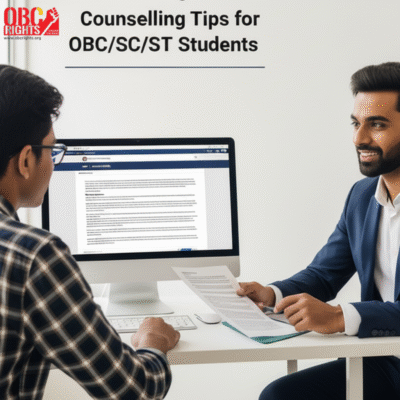Education is a powerful tool that can shape your future, but many students from OBC, SC, and ST communities face unique challenges in their academic journey. These challenges may be societal, financial, or emotional, but with the right mindset and support, you can overcome them. Here are some counselling tips to help you stay strong and achieve success.
1. Understand Reservation Policies and Eligibility
One of the major benefits for students belonging to the OBC, SC, and ST categories in India is the reservation policy. This policy ensures that seats are reserved in government and private institutions to provide equal opportunities for all. Before applying, check:
- Eligibility criteria for reserved categories in different colleges.
- Percentage of reserved seats in each college or university.
- State and national reservation guidelines (some states have additional provisions).
Being well-informed about reservation benefits can improve your chances of securing a seat in a good institution.
2. Build Self-Confidence
The next step to success is self-confidence. Do not let stereotypes or societal biases affect your self-worth. You have immense potential, and your background does not define your capabilities.
3. Research Colleges and Courses
Before attending a college counselling session, take time to explore different colleges and courses. Instead of following what others choose, focus on your interests and career goals. Here’s how you can make better choices:
- Check previous years’ cut-off trends on official admission portals to understand your chances of getting into a particular college.
- Watch guidance videos or read blogs by seniors who have gone through the counselling process. Their experiences can give you useful insights.
- Rank your course preferences based on your interests, not just college popularity. Choosing a well-ranked college is great, but selecting a course you truly enjoy will keep you motivated throughout your studies.
Doing this research will help you make informed decisions when filling in your preferences, ensuring that you choose the best possible college and course for your future.
4. Be Aware of Scholarship and Financial Aid Opportunities
Various scholarships are available exclusively for OBC, SC, and ST students. Explore:
- Scholarships funded by the government, such as the Post-Matric Scholarship and the Central Sector Scholarship, are available..
- Private foundations and NGOs that support marginalised students.
- Merit-based and need-based scholarships provide financial aid.
Applying for scholarships can significantly reduce financial burdens and help you focus on academics.
5. Seek Guidance from Experts and Senior Students
Choosing the right college can be overwhelming, but you don’t have to go through it by yourself. Reach out to:
- Career counsellors for professional guidance.
- Professors or alumni for insights on colleges and courses.
- Senior students from your community can provide practical advice on college life.
- You may visit the website www.obcrights.org for better guidance
Interacting with experienced individuals can help clarify doubts and give valuable insights into life after admission.
6. Understanding the OBC Non-Creamy Layer Criteria
If you are applying under the OBC category, make sure you fall under the Non-Creamy Layer (NCL). Only students who belong to the Non-Creamy Layer are eligible for reservation benefits. The creamy layer includes economically well-off individuals within the OBC category who do not qualify for reservation benefits. A useful counselling tip is:
- Always carry an updated OBC NCL certificate, usually issued within one year before counselling
- If you belong to the creamy layer, you have to apply under the General category
- For detailed information, please visit www.obcrights.org for further guidance.
Many students miss out on their rightful reservation because of not have the correct NCL certificate.
7. Prepare Necessary Documents in Advance
To avoid last-minute stress, gather and organise the necessary documents:
- Caste certificate (valid and issued by appropriate authorities).
- Income certificate, if applicable, for financial aid eligibility.
- Educational certificates and mark sheets from previous institutions.
- Domicile certificate, if needed for state quota benefits.
Having these documents ready ensures a smooth counselling and admission process.
Conclusion
The counselling stage serves as your entry point into college life. With the right information and preparation, OBC/SC/ST students can make the most of the opportunities given under the reservation system. These counselling tips are designed to help you stay informed, confident, and ready to take the next step in your academic journey.
Remember, your background should not limit your dreams—it should empower you to move forward with pride. Good luck with your college counselling!



